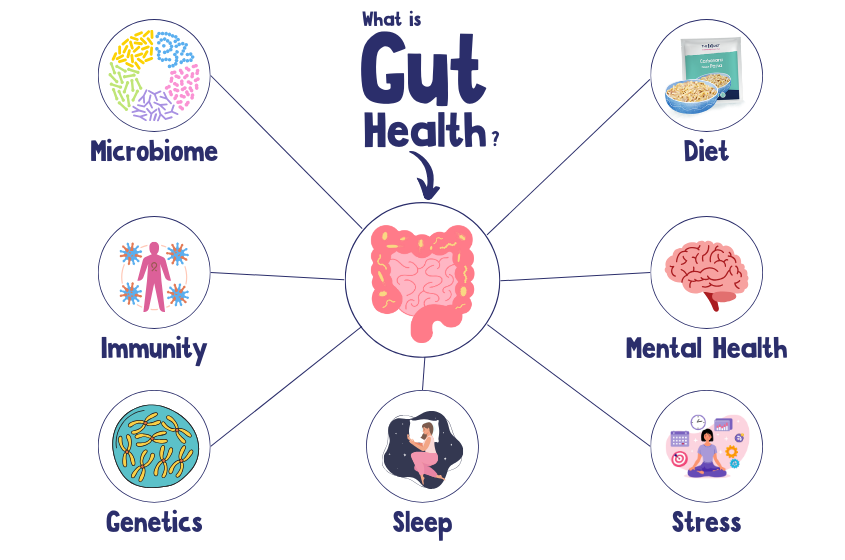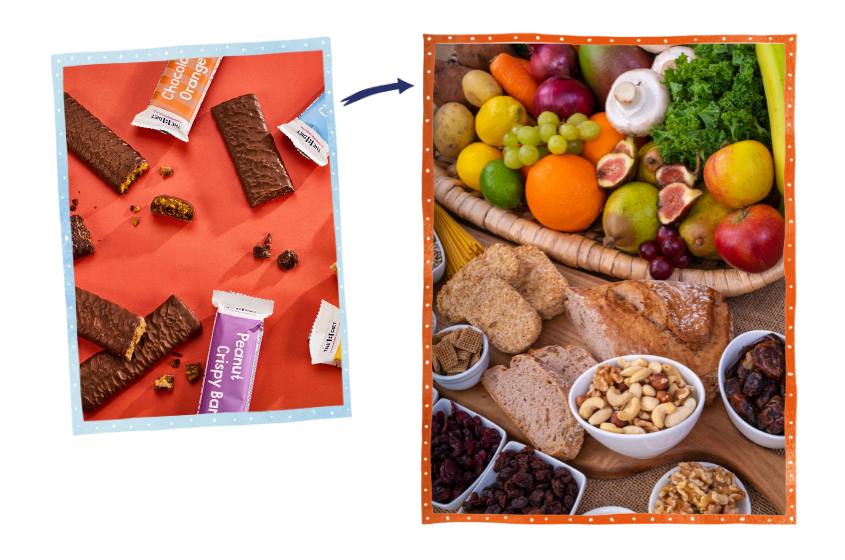Gut health is having its moment and we’re here for it. After all, various studies and research have revealed that having a happy gut is a crucial part of feeling and being healthier.
In this article, we’re diving head first into the world of the gut, exploring everything you need to know and discovering six key steps you can take to improve your gut health.

Ok, first thing’s first, why does gut health matter?
It all comes down to your gut microbiome and how it’s linked to your overall wellbeing.
For a start, 70-80% of our immune system can be found in our gut, with better gut health said to result in fewer sick days.
Secondly, a healthy intestinal lining is crucial when it comes to absorbing all the goodness you eat. You could be eating the healthiest meals, full of vitamins and nutrients, but without a healthy intestinal lining, you’ll be unable to absorb any of the good stuff.
Long story short: a healthy gut = improved overall wellbeing.
What is gut microbiome?
Basically, it’s a name for the 1000s of bacteria and microorganisms that live inside the gut. Initially, the gut microbiome is influenced by how we’re born, for example, if a baby is delivered by caesarean section, they’ll have a microbiome similar to their mother’s skin.
From then onwards, your gut microbiome continues to grow and change based on what you eat and the environment you live in. So, if you have a diet that’s enriched with fibre and plenty of fruit and veg, you’ll likely have a healthy and thriving gut microbiome. If you tend to eat high-sugar foods with little variety, you might be setting your gut up for failure.
What are the signs of an unhealthy gut?
There are so many elements of everyday life that can affect your gut and its microbiome. From high stress to taking antibiotics, just small changes can negatively impact your overall gut health.
In terms of signs to look out for, here are four symptoms of an unhealthy gut you’ll want to keep an eye on:
-
Bloating
-
Diarrhoea
-
Constipation
-
Heartburn
6 ways to improve your gut health
1. Eat fermented foods
When it comes to gut-loving ingredients, fermented food has to be the holy grail. Fermented foods are full to the brim with good bacteria, often having a probiotic effect to help support your digestive health.
Kimchi (spicy, Korean pickled cabbage), Kombucha (fermented black tea drink) and sourdough are just some examples of delicious fermented food that not only tastes great but works magic on your gut.

2. Eat 30 vegetables a week
According to many health science companies, eating 30 plants or vegetables a week can boost the diversity and health of your gut microbiome. But plants doesn’t just mean vegetables, you can also include fruit, nuts and seeds in your 30 checklist too.
So, why 30 different plants or vegetables? Well, variety is key here. Plants contain substances called prebiotics, which help keep the ‘good’ bacteria in your gut thriving. On top of that, the prebiotics in plants also include chemicals called polyphenols, which have antioxidant and anti-inflammatory properties.
Be way though, some research is clear that many people do better by avoiding certain plants, such as the popular FODMAP diet.
3. Eat more fibre
When it comes to gut health, eating foods rich in fibre is an easy win. In fact, according to the NHS website, people who eat plenty of fibre are at a lower risk of heart disease, stroke, type 2 diabetes and bowel cancer.
So, how do you up your fibre intake? Well, for a start, choose one of our meal replacements that’s high in fibre, such as the Fruit & Nut bar. Alternatively, try swapping your usual carbohydrates for high-fibre foods.
Our in-house nutritionist, Mark Gilbert says "we have to be a little bit careful of making sweeping statements here. Fibre isn't the holy grail for everyone. In fact, some people benefit from a low-FODMAP diet (low fibre), some people get improvements with a keto diet (not high in fibre), some people literally only eat meat (‘Carnivore Diet’), eliminating fibre altogether and experience vast improvements so it is just not valid to say that everyone should eat more fibre. A diet has to be geared towards the specific person."
Once again, it comes down to balance and making sure you have a healthy diet and lifestyle. We advise getting most fibre in your normal food meals from non-starchy vegetables and some fruit.

4. Exercise more
We all know exercise is good for you, but did you know it can also have a positive impact on your gut microbiome? Yep, according to Jeffrey Woods, a professor of kinesiology and community health at the University of Illinois, exercise can increase bacterial communities that produce short-chain fatty acids. These types of fatty acids are known to change your metabolism, immunity and other physiological processes, essentially improving your gut’s wellbeing.
So, not only is exercise good for getting your heart rate up, it’s also a great way to keep your gut happy. The microbiome makes the 'feel good' hormone serotonin and some research suggests this could be a reason why exercise improves mood

5. Reduce stress levels
Easier said than done, right? We get it, telling you to avoid stressful situations can be tricky, but keeping cool, calm and collected could be beneficial to your gut health.
From that butterfly sensation to feeling nauseous, it’s not unusual to have physiological symptoms to stress. And according to the NHS, in many people stress can slow down digestion, causing bloating, pain and constipation. In others it can also speed it up, causing diarrhoea.
An easy way to slow your heart rate down and relax is by practising meditation or yoga daily. Even just 10-minutes a day could help calm down any racing thoughts and help to keep your gut happy.

6. Sleep more
Sandy Soni, a gut specialist dietitian at the Gut Health Clinic in London, explains that studies have shown that even after just two days of sleep deprivation, the microbes in your gut can be impacted.
It also works the other way around, with studies finding that those with increased microbiome diversity tended to enjoy better quality of sleep.
So if you’re currently doom scrolling at 11pm or considering watching another episode on Netflix, maybe take a moment to consider your gut and grab an early night.
So, there we have it: 6 ways you can improve your gut health. As you’ve probably noticed, variety is key when it comes to keeping your gut happy and healthy. Whether that’s enjoying diverse meals and supplements, or getting more sleep - every little helps.
Want to get more essential nutrients in your diet? Check out our Taster Pack and explore our collection of yummy, nutritious meals, shakes and bars.



